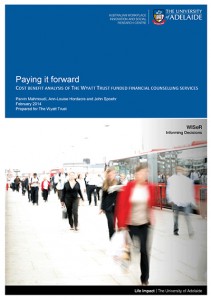 A cost-benefit analysis of financial counselling services funded by the Wyatt Trust in South Australia, has found that every $1 invested provides a $5 return.
A cost-benefit analysis of financial counselling services funded by the Wyatt Trust in South Australia, has found that every $1 invested provides a $5 return.
The research “Paying it Forward” was undertaken by the Australian Workplace Innovation and Social Service Research Centre at Adelaide University and was launched by well-known financial commentator, Paul Clitheroe last week.
“Our clients tell us time and time again about the difference financial counselling makes in their lives”, said Fiona Guthrie, Executive Director of Financial Counselling Australia. “The cost-benefit analysis puts a hard economic edge on that feedback.”
The report showed that:
· 46% of clients were on incomes of less than $20,000 per annum;
· 82% of clients had experienced at least one financial crisis leading, most commonly related to credit card or store card debts (42%) and/or utility debts (40 %). 55% had 2 or more financial crises.
· 86% of clients had experienced at least one personal crisis in the last year, with one-third of these related to housing issues (31 %). 55% had at least two personal crises. Personal crises or those of family members can increase the impact of financial issues.
As the Adelaide University researchers note, the cost-benefit analysis did not include other benefits which are more difficult to quantify, such as improvements in financial literacy, stabilised housing or avoidance of legal action. In other words, the $1:$5 cost benefit is an understated and conservative measure of the benefit of financial counselling.
We know that financial counselling clients often report improvements in health. The average cost of a general hospital admission in Australia is $5,205 per day.[1]
“If the government invested more in financial counselling as a preventative measure, the financial counselling dividend would be huge for government,” said Ms Guthrie. “The return on investment for government in terms of avoided costs, such as in health or housing or the breakdown of relationships would be significant.”
Financial Counselling Australia congratulates the Wyatt Trust on having the foresight to commission this research.
Growing body of evidence about the benefits of financial counselling
The Adelaide University research adds to a growing body of evidence about the benefits of financial counselling. This includes:
· Dr Nicola Brackertz, Swinburne University, “I Wish I’d Known Sooner” (2012). This survey of Salvation Army financial counselling clients showed that:
o 66% said their difficulties had been resolved;
o 53% had avoided bankruptcy;
o 69% felt more positive about the future following financial counselling;
o 63% felt their mental and emotional wellbeing had improved; and
o 45% indicated their physical health had improved.
· Louis Schetzer for Department of Justice (Victoria), “Courting Debt – the legal needs of people facing civil consumer debt problems” (2008). This research showed that financial counsellors were rated as the ‘most useful’ source of non-legal assistance, and the financial counsellor’s role in getting a negotiated payment plan was beneficial
· Consumer Affairs Victoria research by Bluemoon, “Financial Counselling Program Research Report” (2007). This qualitative research found that:
o clients reported relief from the stress and pressure of their immediate financial situation;
o arrangements between clients and creditors were achieved in all cases, for example, establishing payment plans and consolidating debt; and
o clients identified they had developed skills and knowledge to maintain financial stability in the long term including living within their financial means and the confidence to deal with financial institutions.
· ANZ Bank, Understanding Personal Debt and Financial Difficulty in Australia (2005) stated that:
“For people who saw a financial counsellor, it was unanimously a positive empowering experience for them, albeit at a negative point in their life. In addition, the majority stated it had changed the way they viewed their finances and changed their financial behaviour.”[2]
Financial counsellors: community-based professionals providing information, support and advocacy for people in financial difficulty.
Anyone who is in financial difficulty can contact a free and independent financial counsellor on 1800 007 007 or visit www.debtselfhelp.org.au.
[1] Productivity Commission http://www.pc.gov.au/__data/assets/pdf_file/0003/132339/rogs-2014-volumee-chapter10.pdf.
[2] ANZ Bank, Understanding Personal Debt and Financial Difficulty in Australia, November 2005, p 17